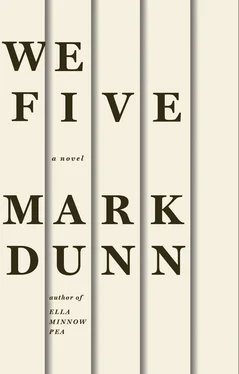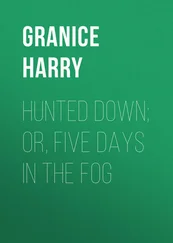“Did you know that when you first showed up on our doorstep like — oh Bert, who was it that walked for days and nights to his aunt’s house in Dover — was it Oliver Twist or David Copperfield?”
“It was David Copperfield, I think. I’m picturing Freddie Bartholomew and that horsey-looking actress — Edna something.”
“Anyway,” Lucille resumed, “you were just skin and bones. Wasn’t Ruth just skin and bones, Bert?”
“Skin and bones and a stomach that hasn’t stopped borbarigging ever since.” Mr. Mobry winked at Ruth, who returned the wink, along with a smile.
Lucille continued: “Those old beldames you’d run away from had been starving you for certain. We should have had them arrested.”
“Well, everything worked out for the best,” said Ruth, reaching across the table to requisition one of Lucille’s boiled potatoes as well. Lucille assented with a nod. “And look at me now, Auntie: I weigh eight hundred pounds. In truth, I should reduce. There’s a chart that hangs in the cloakroom at the factory; it says how much a woman should weigh at such-and-such a height.”
“And how did you measure up to that ideal woman in the chart?”
Ruth shook her head with resignation. “I cannot say the two of us will ever be mistaken for one another.” Ruth laughed ruefully. “I suppose that’s the only silver lining to this ghastly war; most of what’s being rationed or is absolutely unavailable isn’t good for the figure anyway. I have to get ready. We’re all getting together tonight at Jane’s to make plans for Saturday night.”
Herbert Mobry nodded and smiled. “It’s good you’re going out — good that Londoners as a whole aren’t giving in to these damned raids.”
Lucille’s hand flew to her mouth. “Dear brother, you just said a foul word.”
“ Raids ?”
“You know exactly the word I’m referring to.”
“First, Sister, my career as a minister is over, so I needn’t watch my tongue as closely as I used to. Second: it was a perfectly appropriate use of the word. The Nazis and their air raids are to be damned.”
“ Still —” Lucille returned her attention to Ruth. “I assume there’s an A.R.P. shelter near the Palais, if one should be needed.”
“Of course there is, Auntie. And if the sirens sound tonight, I’ll just follow all the others right down into it. You needn’t worry.”
“It cannot be avoided,” Mobry contributed. “I must tell you, though, Ruth, that we do worry less — Sister and me — when you’re close by and safe — well, as safe as any Londoner can be these days. But then again, it’s good to have friends who understand you as Sister and I do.”
“ Do you understand me, Uncle? I am rather a complication.”
“All of God’s children are complications, child. We’re entangled bundles of nerves and sinew and twisted-up brain matter. Who can probe any mind with success, let alone the mind of, say, an Adolf Hitler who each day conceives new horrors to unleash upon the world? Of course, invoking the Fuehrer doesn’t make my point at all. I suspect he is the exception to the rule. There are exceptions to be found now and then — these men of diseased consciences and cankered souls. Our loving Lord and Savior implants a soul in each of His children, but sometimes that soul withers or festers. Hitler and the men who willingly serve him — men responsible for the kind of atrocities that stagger the mind — these men have a sickness that robs them of every ounce of their humanity.”
“Or perhaps they were defective to begin with,” offered Lucille. “Perhaps God dozed off a bit, and Hitler and Goering and Goebbels slipped off the assembly line ill-formed.”
“I would not dismiss that possibility,” said the former pastor, just finishing his postprandial spot of tea. “On the other hand, God — we have been taught — doesn’t make mistakes. So it is a conundrum. But then again, there are a good many mysteries to this world that won’t be solved until after we’re gone on to our reward — and perhaps not even then.”
“Here’s another mystery, Ruth,” said Lucille Mobry, pushing herself away from the table. “It was left on our doorstep this afternoon.” Lucille went to the sideboard to retrieve the parcel she’d placed there earlier. “Your name is on it, but nothing else. It feels like a book.”
“Thank you, Auntie,” said Ruth, taking it. She turned it over in her hand.
“Should we avert our eyes?” asked Mobry, with a grin. “Perhaps it’s from a secret admirer who wishes to go on being ‘secret.’”
“I have no admirers,” shot back Ruth, “secret or otherwise.”
But Ruth knew that she did. And for this reason she went to her room to open the package in private.
Lucille had guessed correctly; it was a book. And one Ruth didn’t have. It was a very special book, in fact, and had come all the way from the United States. Ruth knew this because she knew all about the novel’s troubled history. The Well of Loneliness had come up in conversation between Ruth and her forewoman, Miss Colthurst, at the filling factory. The book had been ordered destroyed by the British courts several months after its publication in 1928. Copies occasionally made their way into the country from France, where it was still being published, and from the United States, where its American publisher was successful in winning a court ruling declaring that the book wasn’t obscene, though it depicted an unambiguous romantic relationship between two women. The conversation between Ruth and Vivien Colthurst orbited round both the story and the curious name of its author, Radclyffe Hall. “She sounds rather like the name of a building, doesn’t she?” asked Miss Colthurst, who put the question to Ruth with a look that indicated an intense interest in knowing just how much Ruth was enjoying their private chat.
Ruth could not believe that Vivien had obtained a copy of the American edition. She looked forward to thanking her friend for going to so much trouble (for surely it wasn’t an easy thing to put one’s hands on such a book). But she looked forward even more to the chance to actually read it.
As Lucille cleared away the tea dishes, Bert Mobry browsed through his copy of Radio Times in his easy chair. With his recent retirement from the pulpit, Mobry was indulging himself in all the radio programmes he’d missed over the last few years. During his many busy seasons in ministerial cassock there had only been time for the news broadcasts, but now he could listen to anything he pleased, although there was much that dis pleased him. He adamantly refused, for example, to twiddle the dial for the broadcasts of the German propagandist Lord Haw-Haw, who set many a Briton’s teeth on edge, though his programmes were popular; with the continuing clamp-down of information on British air and sea misadventures, this was sometimes the fastest way for British citizens to learn the outcome of engagements that did not go so well.
Lucille came into the parlour and stood next to her brother’s chair. “Would you like me to turn on the wireless?”
“If you don’t mind. Once I’m settled into this upholstered marshmallow my poor old back doesn’t allow me to get up without complaint.”
But Lucille remained for a moment longer just where she stood. “Do you think our Ruth might have herself a follower? Perhaps someone who loves to read as much as she does?”
Bert shrugged. “Ruth is an enigma. I cannot say.”
“I’m surprised that she’s going dancing with her friends on Saturday night. But I’m happy for her.”
Bert turned his head to look up at his sister. “Your troubled expression tells me otherwise.”
Читать дальше












